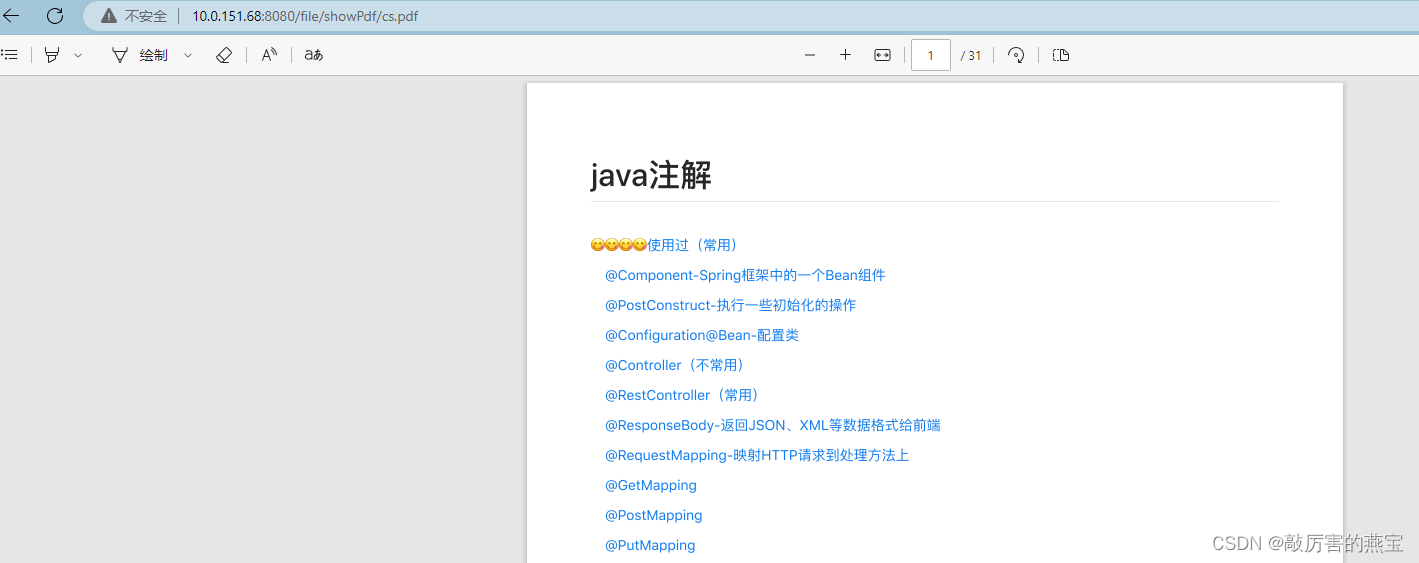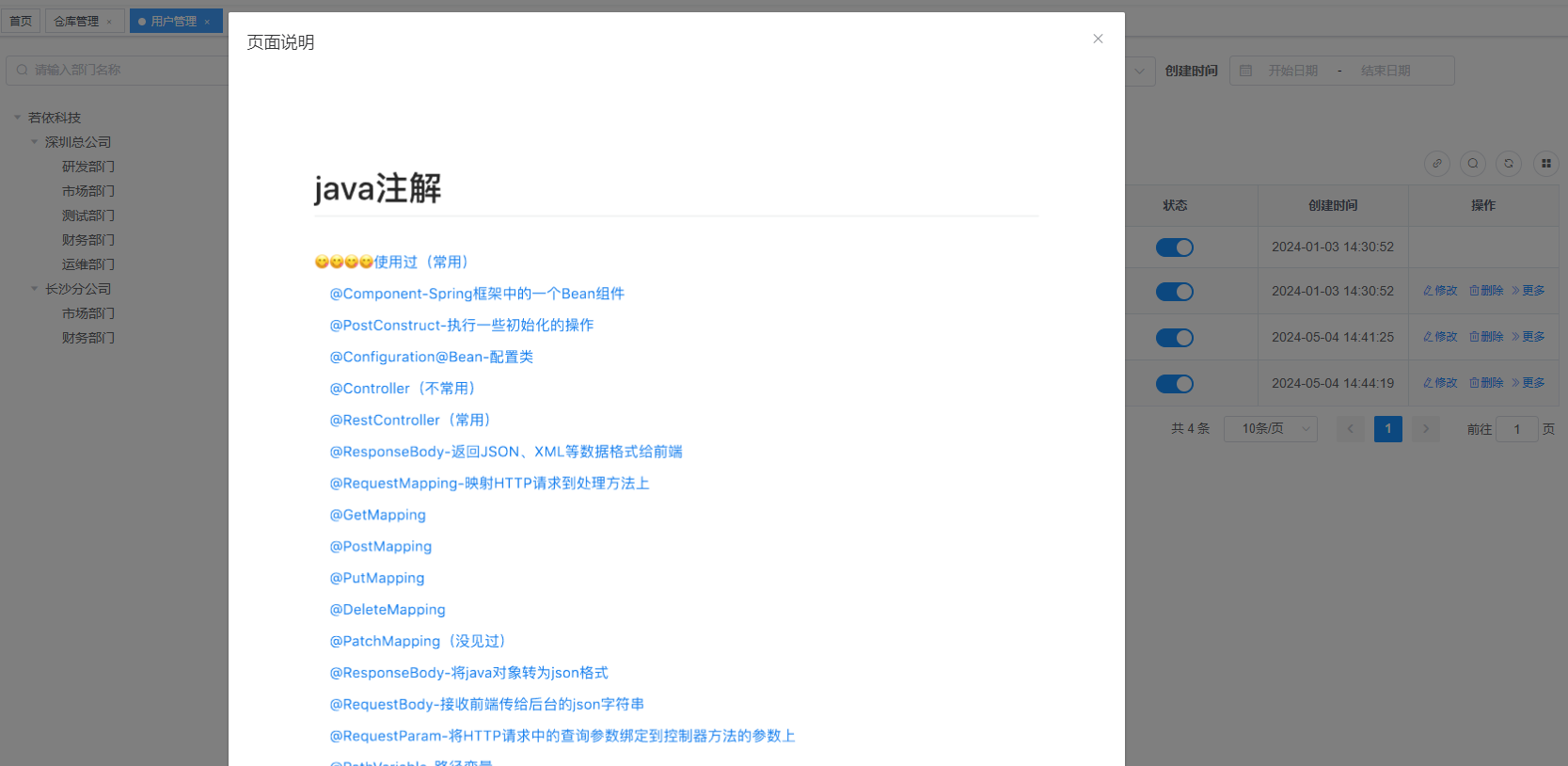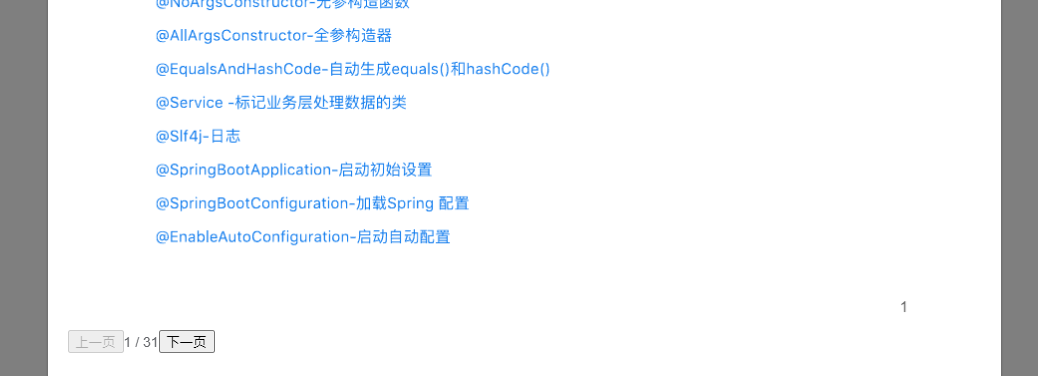后端实现:
使用FileSystemResource包装文件,以便Spring MVC可以处理该资源
创建HttpHeaders对象以设置响应头
设置Content-Disposition头,使得浏览器以内联方式显示PDF(即在浏览器中直接打开)
设置Content-Type为application/pdf,指示响应体是一个PDF文件
构建并返回带有指定头信息和PDF资源的ResponseEntity,状态码为200 OK
后端java代码 :
java
package com.hm.wms.pdf.controller;
import org.mybatis.logging.Logger;
import org.mybatis.logging.LoggerFactory;
import org.springframework.core.io.*;
import org.springframework.http.*;
import org.springframework.web.bind.annotation.GetMapping;
import org.springframework.web.bind.annotation.PathVariable;
import org.springframework.web.bind.annotation.RequestMapping;
import org.springframework.web.bind.annotation.RestController;
import java.io.File;
/**
* @author zy
*/
@RestController
@RequestMapping("/file")
public class PdfController {
//可以系统配置文件路径代替代码中的"E:/cs/"
/**
* 展示PDF文件
* 测试路径:本地E:/cs/cs.pdf 对应http://ip:端口/file/showPdf/文件名
* @param pdfName 文件名
* @return 响应实体,包含PDF文件的资源
*/
@GetMapping("/showPdf/{pdfName}")
public ResponseEntity<FileSystemResource> showPdf(@PathVariable("pdfName") String pdfName) {
if (!pdfName.endsWith(".pdf")) {
throw new RuntimeException("读取pdf文件失败,扩展名错误");
}
// 使用sanitizePath方法确保传入的pdfName路径安全,防止路径遍历等安全问题
String safeFilePath = sanitizePath("E:/cs/", pdfName);
// 根据处理后的安全路径创建File对象
File file = new File(safeFilePath);
// 检查文件是否存在并且是一个标准文件,若不满足条件则抛出异常
if (!file.exists() || !file.isFile()) {
throw new RuntimeException("文件未找到");
}
// 使用FileSystemResource包装文件,以便Spring MVC可以处理该资源
FileSystemResource resource = new FileSystemResource(file);
// 创建HttpHeaders对象以设置响应头
HttpHeaders headers = new HttpHeaders();
// 设置Content-Disposition头,使得浏览器以内联方式显示PDF(即在浏览器中直接打开)
headers.add(HttpHeaders.CONTENT_DISPOSITION, "inline; filename=" + resource.getFilename());
// 设置Content-Type为application/pdf,指示响应体是一个PDF文件
headers.add(HttpHeaders.CONTENT_TYPE, MediaType.APPLICATION_PDF_VALUE);
// 构建并返回带有指定头信息和PDF资源的ResponseEntity,状态码为200 OK
return ResponseEntity.ok()
.headers(headers)
.body(resource);
}
/**
* 确保路径安全,防止路径遍历攻击。
*
* @param baseDir 基础目录
* @param filePath 文件路径
* @return 安全的文件路径
*/
private String sanitizePath(String baseDir, String filePath) {
// 确保filePath不会导致路径遍历,这里简单示例为拼接,实际应用中应使用更严格的安全策略
if (!filePath.startsWith("/") && !filePath.contains("..")) {
return baseDir + filePath;
}
throw new IllegalArgumentException("非法的文件路径");
}
}测试:
启动后端,打开浏览器输入http://ip:端口/file/showPdf/文件名,修改为自己的ip端口和文件名称(其他内容自己修改),若打开pdf文件则说明成功了!
例图:

前端实现1: dialog中预览pdf
想要在页面dialog中打开pdf文件进行预览查看
安装依赖:npm vue-pdf --save
全部vue代码:可自己修改样式
javascript
<template>
<el-dialog :title="title1" :visible.sync="openDetail" append-to-body>
<div>
<pdf
:src="pdfSrc"
:page="currentPage"
@num-pages="onNumPagesLoaded"
@page-rendered="pageRendered"
></pdf>
<div class="pagination">
<button :disabled="currentPage === 1" @click="previousPage">上一页</button>
<span>{{ currentPage }} / {{ numPages }}</span>
<button :disabled="currentPage === numPages" @click="nextPage">下一页</button>
</div>
</div>
</el-dialog>
</template>
<script>
import Pdf from 'vue-pdf';
export default {
components: {
pdf: Pdf,
},
data() {
return {
openDetail: false,
title1: 'PDF预览',
pdfSrc: '', // PDF文件的URL
currentPage: 1, // 当前显示的页码
numPages: null, // PDF总页数
};
},
methods: {
fetchPDF() {
this.pdfSrc = "http://服务器ip:8080/file/showPdf/"+"cs.pdf";
window.open(this.pdfSrc)
},
showDetail() {
this.fetchPDF();
this.openDetail = true;
},
onNumPagesLoaded(numPages) {
this.numPages = numPages;
// 初始加载时尝试渲染第一页
this.currentPage = 1;
},
pageRendered(num) {
// 页面渲染完成后,更新当前页码
this.currentPage = num;
},
previousPage() {
if (this.currentPage > 1) {
this.currentPage--;
}
},
nextPage() {
if (this.currentPage < this.numPages) {
this.currentPage++;
}
},
},
};
</script>结果预览:可点击翻页(可自己拓展滑动翻页)


前端实现2:JS打开新窗口
使用:window.open(url)
可以点击按钮,使用window.open(url)来打开新页面展示pdf文件。
window.open() -打开新窗口
常用于文件、图片预览,或者加载一个新页面。用法:
window.open(Url, WindowName, [strWindowFeatures]);
解释:
strUrl: 新窗口需要载入的url地址
strWindowName:新的窗口的名字 ,可选。
strWindowFeatures: 新窗口的一些设置,可选。比如是否显示菜单栏,是否可以滚动和缩放窗口大小等。示例:
window.open("http://www.baidu.com", "myWindow", "width=500,height=400,resizable=yes");
详细可参考文章 :Window的Open方法,弹窗的特征【超详细篇】_window open-CSDN博客
遇到问题:
文件名为中文时,后端控制台异常

遇到的问题与在使用Content-Disposition头部时编码非ASCII字符(比如中文文件名"仓库管理.pdf")有关。错误消息表明,Unicode字符"仓"无法在HTTP头部预期的范围内正确编码。
为了解决这个问题,应该正确地在Content-Disposition头部中编码文件名。
以下是修改showPdf方法以正确处理包含非ASCII字符文件名的步骤:
- 确保使用UTF-8编码:使用Spring的UriUtils类中的UriUtils.encode方法,以UTF-8格式正确编码文件名。这将正确处理中文等特殊字符。
- 修改Content-Disposition头部:使用UriUtils.encode来设置Content-Disposition头部,以正确编码文件名部分。
以下是修改后的showPdf方法示例:
替换代码即可~
将
java
HttpHeaders headers = new HttpHeaders();
headers.add(HttpHeaders.CONTENT_DISPOSITION, "inline; filename=" + resource.getFilename());
headers.add(HttpHeaders.CONTENT_TYPE, MediaType.APPLICATION_PDF_VALUE);
return ResponseEntity.ok()
.headers(headers)
.body(resource);替换为
java
HttpHeaders headers = new HttpHeaders();
headers.add(HttpHeaders.CONTENT_DISPOSITION, "inline; filename*=UTF-8''" + UriUtils.encode(pdfName, StandardCharsets.UTF_8));
headers.setContentType(MediaType.APPLICATION_PDF);
return ResponseEntity.ok()
.headers(headers)
.contentLength(file.length())
.body(resource);即可!!!
解释:
- UriUtils.encode:该方法确保文件名中的非ASCII字符根据RFC 6266正确进行百分比编码,从而可以安全地在HTTP头部传输。
- Content-Disposition头部:filename参数指定了UTF-8编码的文件名。格式为filename=UTF-8''<编码后的文件名>,其中<编码后的文件名>是文件名的UTF-8编码值。这确保了像"仓"这样的字符在头部中得到正确表示。
- MediaType.APPLICATION_PDF:指定响应体包含PDF文件。
通过正确编码文件名,您可以确保与HTTP标准的兼容性,并避免与无效头部值相关的错误。这种方法应该能够解决您在提供包含中文或其他非ASCII字符文件名的PDF文件时遇到的问题。